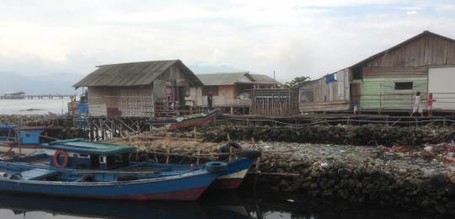
 David Dodman (david.dodman@iied.org) is co-head of International Institute for Environment and Development (IIED)'s Human Settlements Group and team leader for cities and climate change.
David Dodman (david.dodman@iied.org) is co-head of International Institute for Environment and Development (IIED)'s Human Settlements Group and team leader for cities and climate change.
As cities in Asia face up to the challenges of a changing climate, municipal authorities are finding partnerships with researchers can help inform practice and policy.
Towns and cities across Asia and the Pacific are facing multiple shocks and stresses from disasters and climate change, and are building resilience in response to these. Better communication and collaboration between researchers and municipal governments can help urban centres not only to bounce back from these events, but also to transform themselves into places where individuals, communities and economies can survive and thrive.
Representatives from more than 100 cities across the region participated in the first major regional congress on urban resilience, hosted by ICLEI in Bangkok in February.
IIED staff and partners took part in a workshop to consider how research can contribute to this process. Their discussions drew on work that builds understanding of the activities that can make cities better able to face a changing climate, conducted as part of the Asian Cities Climate Change Resilience Network (ACCCRN), and which provided both lessons from practice and new ideas for future directions.
The connections between research and policy for urban resilience have often been based on an assumed linear relationship, in which the role of the researcher is to provide new information that can inform the holy grail of 'evidence based policy'. In practice, the situation is much more complex, with a wide range of local political and economic factors also shaping policy decisions – and an even more substantial set of locally specific pressures affecting the extent to which these decisions are then implemented or enforced.
In a roundtable discussion, researchers and city officials from South and Southeast Asia identified several other ways in which research can help to build urban resilience.
Firstly, researchers themselves can be 'change agents', who are able to shape opinions and inform the actions of urban residents, including low-income and marginalised communities, by providing information and ideas about how to reduce risks and influence city officials. In this regard, researchers should listen to communities and allow them to influence the nature of the research that is undertaken.
Secondly, and related to this, researchers can challenge the actions of city and municipal governments, whether through functioning as 'activists', or – perhaps more constructively - by engaging directly with officials in a range of more-or-less structured settings to enable and support them in designing and implementing plans and projects to build resilience.
Thirdly, researchers can play a role as innovators, engaging with new and emerging issues and priorities that city officials may miss through their focus on everyday needs (particularly where there are limited technical and financial resources for meeting these needs).
Finally, researchers can help municipal governments and other city stakeholders to evaluate the outcomes of particular interventions as a basis for achieving more effective, efficient, and equitable outcomes in the future.
In practice, of course, achieving these types of outcomes is fraught with challenges. The process of building relationships and trust is slow and complex, with each side often failing to appreciate fully the needs and constraints of the other.
The relationships between researchers and city officials exist within networks involving a range of other stakeholders, including research funders, the private sector, and civil society groups. In order for these relationships to be more fruitful, both sides need to negotiate and compromise. The good news is that a growing group of researchers and city officials are willing to do this.
Several opportunities for achieving more productive communication and collaboration are becoming apparent. One clear message from the discussions was the need to move beyond 'consultant-client' relationships, where researchers are only engaged by local authorities to address specific topics without having the space to contribute to the way in which these are decided.
Conversely, researchers ought to have more open dialogues with local governments, service providers, and other urban actors to inform research questions and make them more policy relevant. This requires spaces for dialogue and discussion, in which both sides are able to be more open about their own needs and priorities, and in which research programmes and findings can be co-produced.
Finally, the framing of researchers and policy makers as being on different 'sides' may well be unhelpful. The boundaries between the two are often blurred, with individuals changing roles over time. This inter-change can help in the formation of new partnerships for resilience, bringing together knowledge and action in increasingly effective ways, and these have been tested in various cities around the world, including Durban, South Africa, and New York City.
The research programmes discussed in the roundtable session may be evidence of embryonic progress in this direction for Asian cities, although all participants agreed that these partnerships can take time to flourish.
The recent launch of the expanded ACCCRN provides one possible platform for this, by bringing together a diverse set of stakeholders to develop shared solutions to building resilience.
Source: IIED










